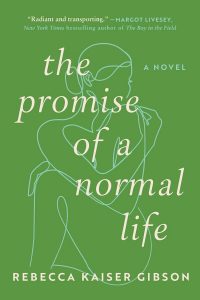The Promise of a Normal Life: A Novel
By Rebecca Kaiser Gibson
Publisher: Arcade (February 7, 2023)
Length: 288 pages
Reader Responses to The Promise of a Normal Life
Reviews of The Promise of a Normal Life
Praise for The Promise of a Normal Life
Order:
- Amazon
- Or your local bookseller
The Promise of a Normal Life: A Novel
For readers of Marilynne Robinson, Elizabeth Strout, and Katie Kitamura, the indelible journey of a quiet young woman—the “silent person” in the Seder—finding her way.
Hailed as “radiant and transporting” (Margot Livesey), The Promise of a Normal Life is a poet’s debut novel, so evocative of life as lived that ittransports you to a time and place you can practically see, touch, and feel. The unnamed narrator is a fiercely observant, introverted Jewish-American girl who seems to exist in a private and separate realm. She’s the child of a first-generation doctor and lawyer—whose own stories have the loud grandeur of family legend—in an America where Jews are excluded from the country club across the street. Her expectations for adulthood are often contradictory. In the changing landscape of the 1960s, she attempts to find her way through the rituals of life, her geography expanding across the country, across the ocean, and into multiple nations.
Along the way, she meets a glamorous hairdresser on a cruise ship to Israel, loopy tarot-card-reading passengers, and Alice-in-Wonderland lawyers in Haifa. There’s a blue-eyed all-American college boyfriend, a mystified tourist agent in the Lofoten Islands, a handsome eligible rabbi in LA, a righteous and self-absorbed MIT professor, and a clandestine, calculating lover in Boston. Eventually, she finds her own compass, but only after being swept to several distant shores by many winds.
Press about The Promise of a Normal Life
“The Promise of a Normal Life is an exquisitely written book. Rebecca Kaiser Gibson’s debut follows an unnamed protagonist who often rebels against her dominant and powerful mother by acquiescing to the desires of the men she loves, believing her ability to thrive hinges on compliance. The novel unfolds in a riveting series of experiences that interrogate womanhood, desire, religion, race, and privilege on the path to personal liberation. It is a novel that haunts through restraint.”
—Cleyvis Natera, author of Neruda on the Park
Poet and author of GIRL AS BIRCH Rebecca Kaiser Gibson’s THE PROMISE OF A NORMAL LIFE, recounting the journey of a keenly observant, introverted Jewish-American girl and woman coming of age in the sixties, encountering bigotry, relationships, sex, and being pushed and pulled through life by powerful parents and a series of feckless men until she comes to realize she can create her own story, to Cal Barksdale at Arcade, in a nice deal, for publication in spring 2023 (world). Rights contact(s): Elena Silverberg
— Publishers Lunch, June 2022
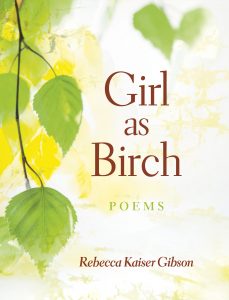
Girl As Birch
By Rebecca Kaiser Gibson
Bauhan Publishing
Trade Paper, $17.00
Publication Date: April 6, 2022
ISBN: 978-0872333338
Bauhan Publishing Book Webpage
Buy Online:
- Powells
- Brazos Bookstore
- Toadstool Bookshop
- Porter Square Books
- Concord Bookshop
- Politics and Prose
- Gibson’s Bookstore
- Or your local bookseller
Girl as Birch
In Girl as Birch, Gibson mimics the flexible (too pliant? healthily, if secretly, resilient? then, finally, aligned) motion of a birch in strong wind, as it relates to the options seemingly available to her growing up as a girl. The poems imitate in form the experiences they evoke. The leitmotifs of red, birches, mirrors, walls enclosing gardens, labyrinths as metaphors for constraint, recur throughout the book. Without being a manifesto, Girl as Birch explores female gender roles with both pliant and uprising imagery and action. Restriction and rebellion, silence and speech, appearance and artifice, passion and repression, the past and being present, buffet and embolden the speaker of these poems. The elastic and varied syntax, pace, music, and the use of rhetoric and wit express deft self-examination. The book moves from serial impressionistic poems of early childhood to discrete lyric poems of memory and experience and on to a sense of emotional, social, spiritual evolution, not resolution.
Praise for Girl as Birch
…both restraint and rebellion perform their complicated dance inside this girl, and we witness her, a bud blossoming as the book unfurls, hemmed in by walls and gardens and garter belts but also romping “the terraced vineyards of flirtation” and gaining practice in the art of inuendo… —these poems are arias in which “spores of earth” and “siphoned starlight” comingle, and the result is rich and life-affirming.
—Meg Kearney, All Morning the Crows
Rebecca Kaiser Gibson’s Girl as Birch is a wonder of lyric compression and subtle music. At times deeply personal, at times nearly mythic, these poems meditate on the complexities of memory and mortality, the fact of the female body, and the lessons of the natural world, cultivated and wild. Here is a poet comfortable with an intimate whisper, alive to nature, and at ease in silence and splendor. These are beautiful poems and I’ll return to them with great pleasure.
— Kevin Prufer, author of The Art of Fiction (Four Way Books)
The poems in Rebecca Kaiser Gibson’s Girl as Birch lean away from resolutions and certainties and instead, with astute and lyrical observations, lean into a powerful sense of a mind in action. As the title suggests, the outside world is seen through an inwardness that confers both grace and subtlety (Once, still as July—/lilies, black cove waters—/I hovered in heat/with dragonflies.) As well, many of the poems convey a portrait of a restless intellect communing with worldly—and unworldly—things, often using sonic textures to intensify the experience (Walk west where ghost girls rush/from forsaken life/drawing clouds, no footprints/to open bogs dark sweep). The immense pleasure of these poems arises from their depth of seeing as well as from their mastery of form, image and idea, while the drama that resides beneath the surface infuses the poems with tension and danger. Alive with imaginative swerves, leaps and layered imagery, this is masterful writing—and a joy to read.”
—Joan Houlihan, author of It Isn’t a Ghost if it Lives In Your Chest (Four Way Books)
It is rare for me to read a book of poetry straight through, one poem after the other, yet that is just what I did with this lovely collection from Rebecca Kaiser Gibson—and then I went back and read it again. I gasped when I got to ‘Lilla, Once’—heard (and felt) her raucous laugh. I love Gibson’s use of the garden and plants, and the color red, bending and swaying and bleeding. My favorite line: “She gathered glossy shells / empty of a larger life.” Gibson writes from the heart and readers should feel favored and grateful that she has shared these treasures.
—Jude Sales, lead book buyer of Readers Books (Sonoma, CA)
Like the intimacy found inside a walled garden, Rebecca Kaiser Gibson’s exquisite poems in Girl as Birch meditate on the domain of girlhood, coming of age, and the joys and dangers of life lived as a woman. Her luxurious play with language renders each poem simultaneously fierce and delicate. Her words and voice, “sharp as green apples,” magnified by a relationship to mythology and ekphrasis, remind us of the delight of knowing and rediscovering the self and of our own relationship with the natural world that reveals the private interior spaces we inhabit.
— Didi Jackson, author of Moon Jar (Red Hen Press)
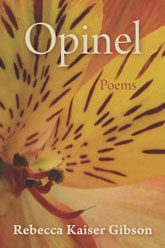
Opinel
Poems
Rebecca Kaiser Gibson
Paperback, 80 pp. 6.5 x 8.5,
ISBN: 978-0-87233-202-7
$16.50
Opinel
From the Bauhan Publishing website:
OPINEL is the name of a workaday knife from the Haute-Savoie wielded by shepherds and farmers in the high pastures of the Alps when a tool for paring, shaping, cutting into, scraping out of, or freeing is useful. These poems likewise cleave away the false and deceptive to clarify and reveal a startling and unifying wonder. In language radiant, lovely, and disturbing, Rebecca Kaiser Gibson explores the linkages between the uncomfortable familiar and the curiously intimate strange, making unexpected connections between phenomena. Arranged by association rather than chronology and connected by a sensual intelligence, this collection wanders from Maryland and India to Boston, France, New Hampshire and Ireland—from Ezekiel’s Flight and the Book of Kells, to the Tamil goddess, Meenakshi.
Rebecca Kaiser Gibson grew up in Maryland, lives in Marlborough, New Hampshire, and teaches poetry at Tufts University. In 2008, she received the Artist Fellowship in Poetry from the Massachusetts Cultural Council. A previous resident at the MacDowell Colony and The Heinrich Boll Cottage in Ireland, in 2011 she received a Fulbright Fellowship to teach poetry in Hyderabad, India. Her poems have been published in Agni, Antigonish, The Boston Phoenix, Field, The Greensboro Review, The Harvard Review, MARGIE, Mothering, Northwest Review, Pleiades, Salamander, Slate, The Adroit Journal, 236 Magazine, Tupelo Quarterly, Tupelo’s 30/30 project, the Taos Journal of International Poetry & Art, reprinted in an anthology called Cadence of Hooves, and featured on Verse Daily. She has previously published two chapbooks—Admit the Peacock and Inside the Exhibition.
Praise for Opinel
Sharply observed, intensely felt, and alive with crisp images and surprising diction, the poems of Opinel range over painful childhood memories, adult immersions in ‘foreign’ cultures, and the mysteries at the heart of long-lasting, self-renewing love. In all Rebecca Kaiser Gibson weighs and sifts experience, assays it not only for its worth, but also for its hints about undiscovered meanings and complexities of feeling. The sturdy, all-purpose peasant knife that gives this collection its title turns out to be an image of the poet’s mind at work, an instrument that enables her to peel back the surfaces, restlessly hoping that a revelation might be here, vivid and real, in what she holds in her hands.
— Fred Marchant, author of The Looking House (Graywolf Press)
Like the wooden-handled knife it’s named for, Opinel is a book that pierces and sculpts the poet’s personal history into something both painfully exposed and delicately rendered. With an incisive eye for the minute and the mystifying, Rebecca Kaiser Gibson offers us an elegant book dedicated to extreme attention—to grief, to loss, to encounters, and to the forgotten items in the dusty trunk of oneself. With an understated yet munificent voice she asks, without irony or ego, why not lengthen myself belly first, sensing? so that we all might, like the animals we are, perform this graceful act of observation together.
—Ada Limón, author of Bright Dead Things (Milkweed Editions)
I’ve read and reread this book three times already, and I still don’t think I’m done with it yet. This is the highest form of praise I can give.
—Joanna Valente, Luna Luna Magazine
Rebecca Kaiser Gibson’s poetry reminds us what we treasure in a mature voice: the extraordinary patience, the quiet resignations, an all-right-then-I’ll-show-you kind of intimacy, and a deep, reassuring sense of what matters and why.
— Jeffrey Levine, Editor-in-Chief of Tupelo Press
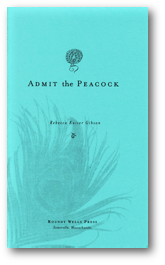
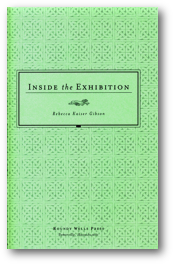
Admit the Peacock and Inside the Exhibition
What others say:
“[She is] the mistress of endings! I so admire [her] ability to finish a poem with a surprising but perfect line. What a pleasure.”
— Holly Prado-Northup
“What highly accomplished, crafted, beautiful, mysterious, witty and mesmerizing poems. [Gibson] does something with language like no one else, startling images, sensuous and humorous and fresh, and the way the poems often end on a line that’s luminous with despair and laughter. … I am just rereading Inside the Exhibition for the sheer pleasure it gives me – wonderful. The poems are so crisp, economical and mysterious. I love them and have taken the liberty of translating some into German.”
— Eva Bourke

